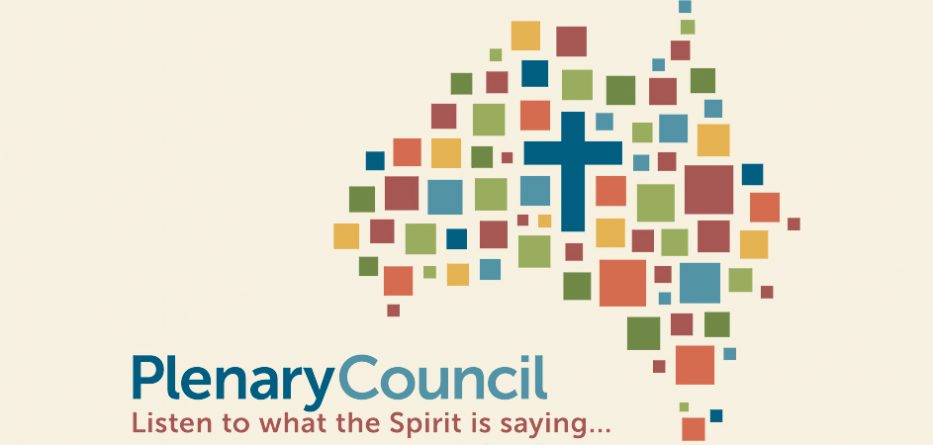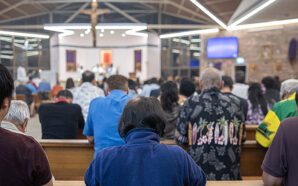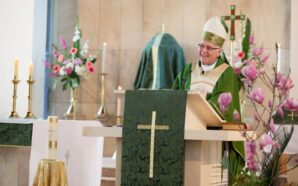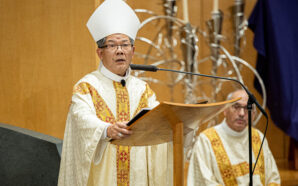A key component of the Plenary Council’s assemblies will help members to consider the 16 questions that make up the Council agenda.
Related: A new prayer and resources in the countdown to the Plenary Council
Related: Why a Plenary Council?
Each day, some of those questions will be the focus of small group discernment, with about 10 members engaging in what is known as “spiritual conversations”. What are spiritual conversations? And how do they work?
Br Ian Cribb SJ, who led a retreat for the Australian Bishops in 2019, answers some questions about how the spiritual conversations process will benefit the Plenary Council members as they discern the questions before them.
What are the origins of the practice of spiritual conversations?
The ultimate source of this practice is Scripture, in which we see countless examples of important conversations and moments or periods of discernment. Such examples begin in Genesis and run throughout the Old Testament. In the Gospels, we read of many important conversations Jesus has, including with the Samaritan woman and the rich young man.
One of the most important conversations in the Gospels is between the Angel Gabriel and Mary in the Annunciation. That conversation is the very model of the steps in discernment.
Within my order, the Jesuits, the process of spiritual conversation goes back to our early years, when members of the Society of Jesus were trying to discern the way forward when plans to go to Jerusalem were thwarted. Through work and prayer and conversation, the next steps became clearer.
How does it differ from other processes used for decision-making?
The critical role that prayer plays in the various aspects of the spiritual conversations is an obvious difference from some other processes. But it’s also the disposition that we have to ourselves and to others with whom we are entering into this conversation. We come to the conversation praying for an inner freedom to engage with the process.
We work from the premise that the Spirit of God is at work in the world, in the Church, in our mission and in every person. Our desire is to see what the Trinity is trying to do in the world today and to better collaborate in God’s mission. By doing that, we are entering into spiritual conversations.
Without prayer, discernment is empty; we remain in our heads.
What are the non-negotiables for such an approach?
Like all conversations, the critical components are speaking and listening. It is intentional speaking and intentional listening that can create the necessary environment for a genuinely spiritual conversation.
As part of a group, each person will do more listening than talking. That listening should be welcoming and non-judgmental. There should be a sense of respect for and trust in each other.
The skill of deep listening involves suspending all judgement, quietening your mind and focusing on the other person. It involves you giving them your undivided attention to truly understand what they are saying. We are listening to more than words, to what is coming from the heart.
Intentional speaking is also critical. That means thinking before you speak, choosing your words carefully and, in this context, that includes praying before you speak. People can practise developing mindfulness about what you say, when you say it and why. Body language matters, as does tone of voice.
What are the advantages of spiritual conversations?
When a group enters into spiritual conversation, it leaves room for the Holy Spirit to work. It builds a sense of community and trust. It enhances respects for one another. It provides the chance for people to speak without interruption – something that can be hard to find today. It avoids having one person dominate a conversation. It allows us to listen to each other and learn from one another.
How will spiritual conversations work in the Plenary Council?
The Plenary Council members have already had a chance to experience spiritual conversations in the online environment, so they will be familiar with the process. They will have experienced leaders to guide them through the process, allowing all members to fully enter into the time of discernment. That is critical to this working well.
There will be a chance for the groups to look at the pros and cons of the topic being discerned and to report back to a larger group, and then ultimately the whole group of members, sharing the fruits of their conversation.
Some of the questions being asked are significant and challenging. Will they be able to be answered through this process?
The truthful answer is “I don’t know”, but this is a great method to address those questions. Pope Francis says in Let Us Dream that “To enter into discernment is to resist the urge to seek the apparent relief of an immediate decision, and instead be willing to hold different opinions before the Lord, waiting on that overflow. You consider reasons for and against, knowing Jesus is with you and for you.”
It is important that members understand that, that they know that an immediate decision isn’t always possible or desirable, but through prayer and conversation, a group can start to hear what the Spirit is saying.
How spiritual conversation works
After a period of prayer, the group undertakes three rounds of sharing
ROUND 1: GATHERING
- Everyone speaks for two to three minutes
- Speakers work in a clockwise direction
- What was the fruit of my prayer?
- Begin with the phrase: “In my prayer today…”
- The group pauses for a period of prayer
ROUND 2: GATHERING WHAT I HEARD IN THE GROUP
- Everyone speaks for one to two minutes.
- Speaking order is clockwise.
- What consoled me or struck me as I listened to my companions? What did I hear? What did I feel? What was the Spirit saying to me/us?
- Begin with the phrase, “In the group I heard…and it left me feeling”.
- The group pauses for a period of prayer
ROUND 3: MOVING FORWARD
- Free-flowing conversation, with no particular speaking order.
- A time for clarifying what I heard. Can someone clarify their thinking? What are the feelings of the group? Is there some consensus or disagreement? What is the way forward? The leader helps to summarise the discussion.
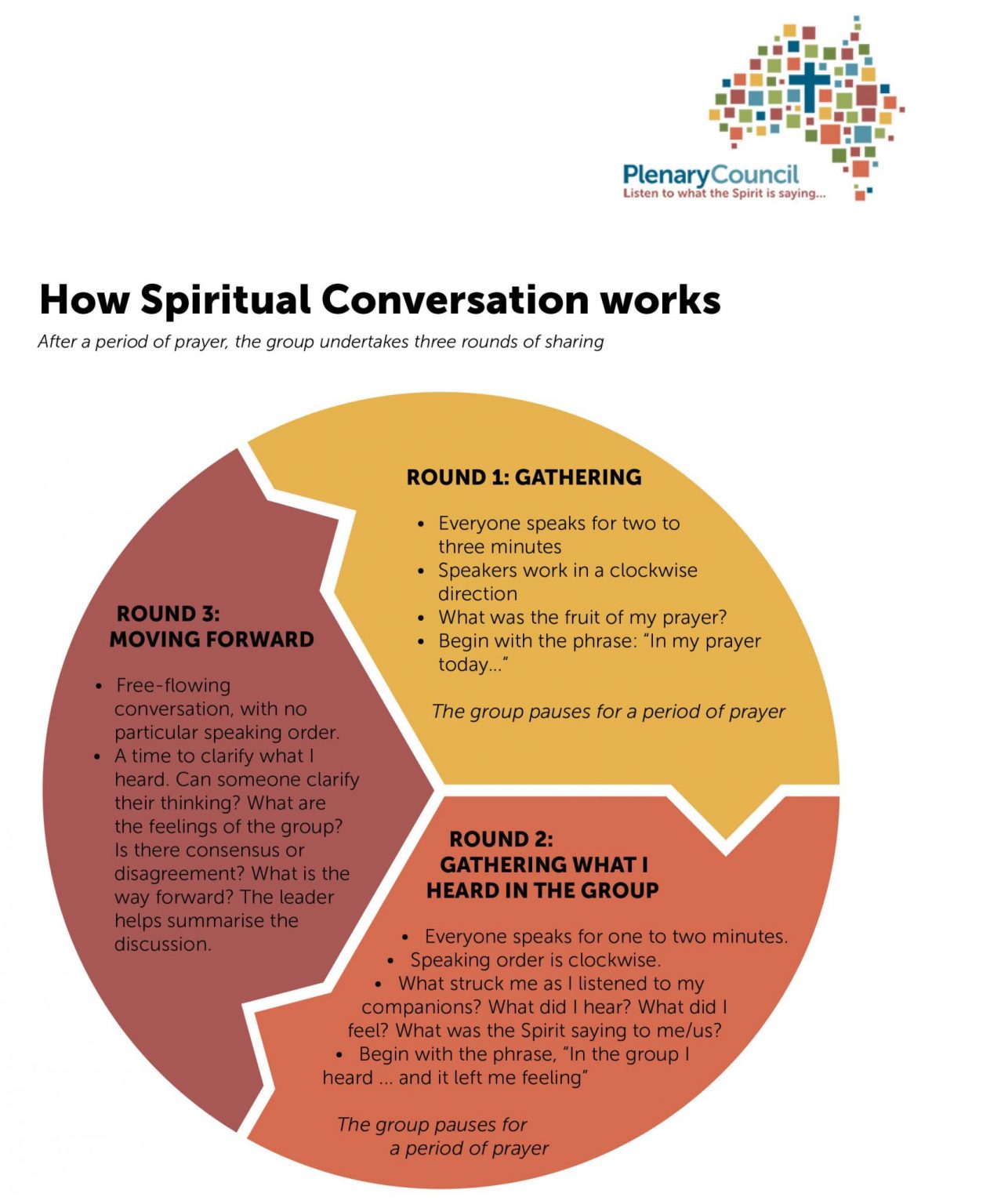
How Spiritual Conversation works in the Plenary Council setting. Image: Plenary Council/ACBC/Supplied
With thanks to the Australian Catholic Bishops Conference.
A new website at parracatholic.org/plenary-2021 directs parishioners to key documents including the Agenda of the first assembly, information about the Members from the Diocese of Parramatta, and feedback from parishioners from the Diocese who took part in the Listening phase. There are also quick links to the national Plenary Council resources. The prayer card can be downloaded from this link.
The Members of the Plenary Council want to hear from parishioners on what they think about the questions on the Agenda. Feedback can be sent to comms@parracatholic.org so it can be passed onto them. In coming weeks we will also be featuring the thoughts on the Agenda questions from parishioners in our Diocese on Catholic Outlook.




